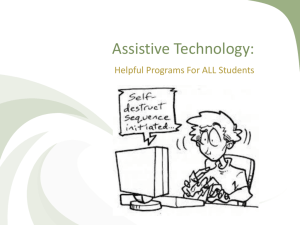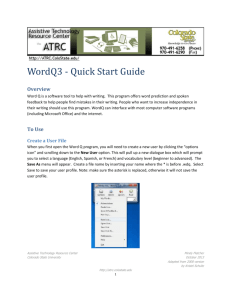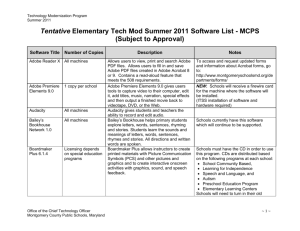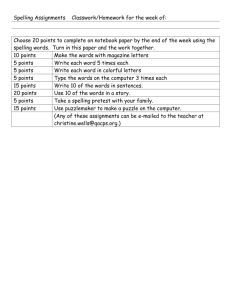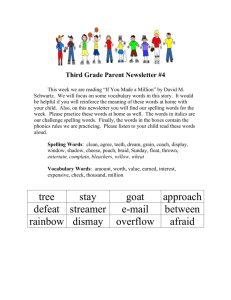Word Q(4)
advertisement
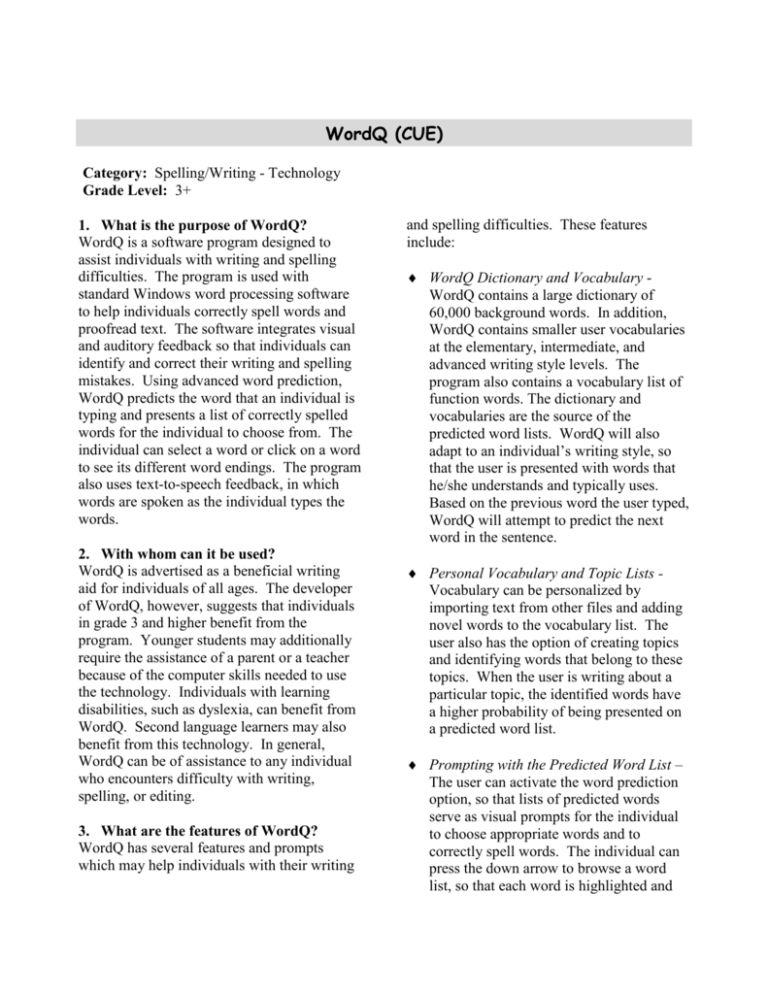
WordQ (CUE) Category: Spelling/Writing - Technology Grade Level: 3+ 1. What is the purpose of WordQ? WordQ is a software program designed to assist individuals with writing and spelling difficulties. The program is used with standard Windows word processing software to help individuals correctly spell words and proofread text. The software integrates visual and auditory feedback so that individuals can identify and correct their writing and spelling mistakes. Using advanced word prediction, WordQ predicts the word that an individual is typing and presents a list of correctly spelled words for the individual to choose from. The individual can select a word or click on a word to see its different word endings. The program also uses text-to-speech feedback, in which words are spoken as the individual types the words. 2. With whom can it be used? WordQ is advertised as a beneficial writing aid for individuals of all ages. The developer of WordQ, however, suggests that individuals in grade 3 and higher benefit from the program. Younger students may additionally require the assistance of a parent or a teacher because of the computer skills needed to use the technology. Individuals with learning disabilities, such as dyslexia, can benefit from WordQ. Second language learners may also benefit from this technology. In general, WordQ can be of assistance to any individual who encounters difficulty with writing, spelling, or editing. 3. What are the features of WordQ? WordQ has several features and prompts which may help individuals with their writing and spelling difficulties. These features include: WordQ Dictionary and Vocabulary WordQ contains a large dictionary of 60,000 background words. In addition, WordQ contains smaller user vocabularies at the elementary, intermediate, and advanced writing style levels. The program also contains a vocabulary list of function words. The dictionary and vocabularies are the source of the predicted word lists. WordQ will also adapt to an individual’s writing style, so that the user is presented with words that he/she understands and typically uses. Based on the previous word the user typed, WordQ will attempt to predict the next word in the sentence. Personal Vocabulary and Topic Lists Vocabulary can be personalized by importing text from other files and adding novel words to the vocabulary list. The user also has the option of creating topics and identifying words that belong to these topics. When the user is writing about a particular topic, the identified words have a higher probability of being presented on a predicted word list. Prompting with the Predicted Word List – The user can activate the word prediction option, so that lists of predicted words serve as visual prompts for the individual to choose appropriate words and to correctly spell words. The individual can press the down arrow to browse a word list, so that each word is highlighted and read out loud for the individual. In addition, when the individual makes a spelling mistake, the list of predicted words becomes blank to inform the individual that no correctly spelled word matches that sequence of letters. Letter and Word Echo Prompts - As part of text-to-speech feedback, the individual can activate the Speech option, so that letters and words are echoed by WordQ. These echo prompts allow the individual to determine whether the letter or word that was typed was the intended letter or word. The user can also detect if a word is incorrectly spelled, because it will not sound right. Or if the user leaves out vowels, WordQ will read out the word letter-by-letter, which also indicates that a word is incorrectly spelled. Sentence Echo Prompt - Sentence echoing can also be used, which helps the user hear the word flow of the sentence and determine if the word order is correct. This also allows the user to detect if words are missing from the sentence and if the punctuation is correct. WordQ will not echo a sentence if the individual leaves out punctuation. This cues the individual that punctuation is missing from the sentence. A combination of letter, word, and sentence echoing can be used. Reading Text Feature – The user can activate WordQ Read mode to highlight and read several sentences. This prompting feature can be used for proofreading one’s own work or for reading existing text scanned into WordQ. The user reads a sentence by pressing the spacebar. The sentence is spoken to the user word-by-word as each word is highlighted by WordQ. While reading a sentence, the user can pause by pressing the spacebar, which is useful for locating errors in a sentence. 4. What teaching procedures should be used with WordQ? For teachers who wish to use WordQ software in the classroom, content- and topic-related words will need to be entered into the WordQ vocabulary lists and topic lists. Class and curriculum materials can also be scanned into WordQ, so that students can use the reading text feature to read these materials. This requires advanced teacher preparation and planning. 5. In what types of settings should WordQ be used? WordQ software can be used in any setting where a computer or laptop is available. This may include school settings, such as special education and regular classrooms. WordQ can also be installed on an individual’s personal computer in the home. 6. To what extent has research shown WordQ to be useful? Only a handful of review studies have been conducted on word prediction software. However, because of WordQ’s recent release in 2001, it has not been included in these reviews. These studies suggest that word prediction programs decrease the number of spelling and grammatical errors made by students with learning disabilities. The overall quality of writing also improves. The results of word prediction studies, however, should be interpreted with caution. All of these studies have included small sample sizes of elementary school-aged children, so it is not clear if the findings generalize to larger groups of children. However, the results still are encouraging and suggest that word prediction programs may help improve the spelling and writing of learning disabled students. Future directions for research may involve examining how older students and second language learners fare with word prediction programs. Product Information WordQ Version 1.4 $241.50 (English) per single user license $253.00 (French) per single user license Computer Requirements: Windows 95/98/2000/XP, Windows NT 4.0 Word Processing Software (e.g., Microsoft Word, Notepad, Wordpad) WordQ is available in many languages including European French, German, Canadian and US English. Developer Information Bloorview MacMillan Children’s Centre Fraser Shein 350 Rumsey Road Toronto, Ontario M4G 1R8 (416) 424-3855 ext. 3538 References 1. MacArthur, C.A. (2000). New tools for writing: Assistive technologies for students with writing difficulties. Topics in Language Disorders, 20, 85-100. 2. WordQ Writing Aid Software. (2004). Writing made easier with word prediction and speech output: Helping those with learning disabilities or who are learning a second language. Retrieved November 10, 2004 from http://www.wordq.com Reviewed by: Angela Varma

